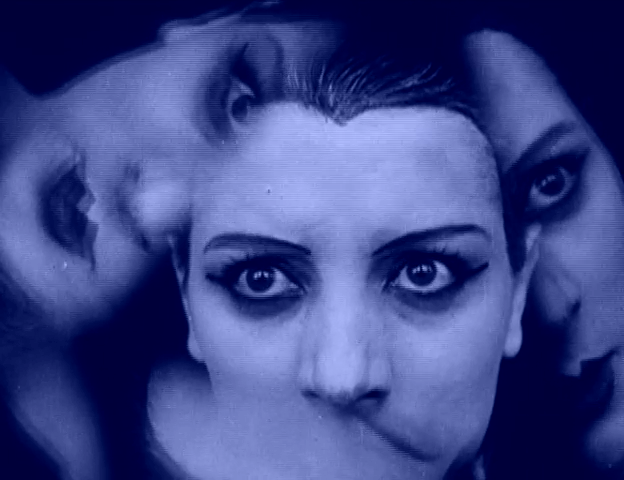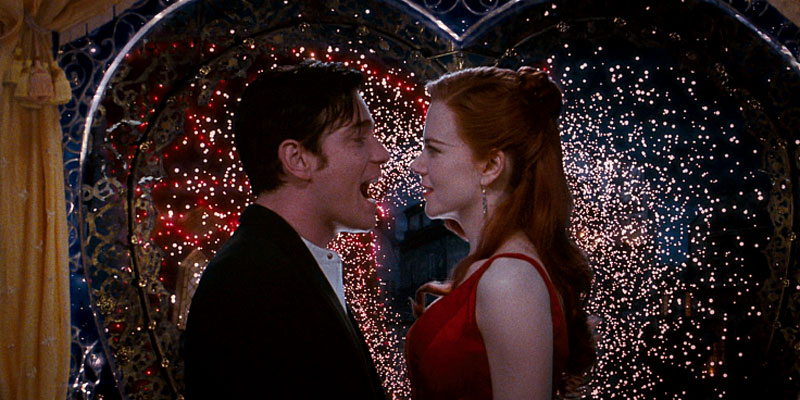Ballet Mécanique
(1924, Fernand Léger & Dudley Murphy, France/USA)
Mesmerizing Dadaism. Built like a mechanical symphony, complete with musical repetition and a fantastic score that must be heard to be believed -- it includes airplane propellers screaming and programmed pianos doing impossible things. It's short, but incredibly impactful, and those who have an affinity for the more playful side of Dada will find much to rejoice with here.
Mesmerizing Dadaism. Built like a mechanical symphony, complete with musical repetition and a fantastic score that must be heard to be believed -- it includes airplane propellers screaming and programmed pianos doing impossible things. It's short, but incredibly impactful, and those who have an affinity for the more playful side of Dada will find much to rejoice with here.
Berlin: Symphony of a Great City
(1927, Walter Ruttmann, Germany)
The "city symphony" sub-genre of the 1920s was high modernity at its most celebratory. A tribute to a great lost city, this visually spectacular film is strangely exciting, given that it is virtually without dialogue and only has a threadbare narrative structure. Ruttmann was known for creating abstract animated films up to this point, and his knack for rhythmic editing is in full-blown glory here. The film is a brilliant time capsule of Weimar Germany, and a glimpse into a long-lost world.
The "city symphony" sub-genre of the 1920s was high modernity at its most celebratory. A tribute to a great lost city, this visually spectacular film is strangely exciting, given that it is virtually without dialogue and only has a threadbare narrative structure. Ruttmann was known for creating abstract animated films up to this point, and his knack for rhythmic editing is in full-blown glory here. The film is a brilliant time capsule of Weimar Germany, and a glimpse into a long-lost world.
Children of Men
(2005, Alfonso Cuarón, USA)
Cuarón is perhaps our greatest contemporary director, and it is with Children of Men that he truly established himself. The sense of melancholia is thick like a heavy fog, but it's also an unexpectedly gorgeous film: some of the greatest cinematography and set direction I have ever seen is in this film, with its dense fabric of mise-en-scène that draws inspiration from the photojournalism of the mid-2000s. Cuarón has an amazing ability to make me cry, and the scene that guarantees the waterworks from me is the descending of the staircase: hope from within the darkest place.
Cuarón is perhaps our greatest contemporary director, and it is with Children of Men that he truly established himself. The sense of melancholia is thick like a heavy fog, but it's also an unexpectedly gorgeous film: some of the greatest cinematography and set direction I have ever seen is in this film, with its dense fabric of mise-en-scène that draws inspiration from the photojournalism of the mid-2000s. Cuarón has an amazing ability to make me cry, and the scene that guarantees the waterworks from me is the descending of the staircase: hope from within the darkest place.
Švankmajer is a surrealist master, and his animations are always a visual and philosophical treat. Another short, it is a series of wild stop-motion vignettes that are without actual speech, but are ultimately about human dialogue and communication, alternately moving and hilarious. You'll never look at a tube of toothpaste the same way again.
Germany, Pale Mother
(1980, Helma Sanders-Brahms, West Germany)
This harrowing film has never left me, much like Elem Klimov's Come and See. I can still hear the final scene crystal-clear, as a young girl cries for her mother. This feminist autobiography is part of the Young German Cinema movement of West Germany in the 1970s, a generation of filmmakers that tried to make sense out of their parents' actions during WWII. Acclaimed upon its release (though cooly received by German critics, who thought the film sentimental and 'airing dirty laundry') the film spent more than two decades in relative obscurity, until a restoration was released on DVD.
The Horse Thief
(1986, Tian Zhuangzhuang, China)
The 2001: A Space Odessey of Tibetan Buddhism. It's an awe-inspiring work, with Martin Scorsese declaring it the best film he saw in the 1990s. The film has jaw-dropping cinematography, hypnotizing music and soundscapes, and a moving humanist touch. We can see Zhuangzhuang as a filmmaker rebel, out of step with Chinese authorities who wanted to ban the film, his film is probably best seen on a large screen: you'll want to drink in all the details, and get lost in the Himalayas.
This harrowing film has never left me, much like Elem Klimov's Come and See. I can still hear the final scene crystal-clear, as a young girl cries for her mother. This feminist autobiography is part of the Young German Cinema movement of West Germany in the 1970s, a generation of filmmakers that tried to make sense out of their parents' actions during WWII. Acclaimed upon its release (though cooly received by German critics, who thought the film sentimental and 'airing dirty laundry') the film spent more than two decades in relative obscurity, until a restoration was released on DVD.
The Horse Thief
(1986, Tian Zhuangzhuang, China)
The 2001: A Space Odessey of Tibetan Buddhism. It's an awe-inspiring work, with Martin Scorsese declaring it the best film he saw in the 1990s. The film has jaw-dropping cinematography, hypnotizing music and soundscapes, and a moving humanist touch. We can see Zhuangzhuang as a filmmaker rebel, out of step with Chinese authorities who wanted to ban the film, his film is probably best seen on a large screen: you'll want to drink in all the details, and get lost in the Himalayas.
Late Spring
(1949, Yasujiro Ozu, Japan)
(1949, Yasujiro Ozu, Japan)
Kurosawa may get the lion's share of attention from the West, but Ozu is perhaps the true darling of Western scholars and critics -- and with a work like Late Spring, it is easy to see why. Tokyo Story is his most well-known film, and is certainly also a masterpiece, but I found that I preferred Late Spring, a truly touching portrait of father and daughter. The film also explores such binaries as the traditional and the modern, the rural and the urban, male and female. All of Ozu's tricks are here, including the tatami mat POV, leisurely pacing, and naturalistic performances. Simply beautiful.
The Marriage of Maria Braun
(1979, Rainer Werner Fassbinder, West Germany)
Fassbinder is one of my favourite filmmakers, and with such a prolific list of films it's difficult to say where to begin: so I suggest with this, the story of the epic rise of a ruthless woman who has one sentimental weakness. Fassbinder's sterile melodrama is my second Young German Cinema selection on this list, but it's certainly worthy of mention. Witness one of the great performances of European art house cinema with Hanna Schygulla's embodiment of "the Mata Hari of the economic miracle", but also marvel at Fassbinder's Brechtian approach that still manages to get under your emotional skin.
Fassbinder is one of my favourite filmmakers, and with such a prolific list of films it's difficult to say where to begin: so I suggest with this, the story of the epic rise of a ruthless woman who has one sentimental weakness. Fassbinder's sterile melodrama is my second Young German Cinema selection on this list, but it's certainly worthy of mention. Witness one of the great performances of European art house cinema with Hanna Schygulla's embodiment of "the Mata Hari of the economic miracle", but also marvel at Fassbinder's Brechtian approach that still manages to get under your emotional skin.
Moulin Rouge!
(2001, Baz Lurhmann, USA/Australia)
Baz Luhrmann's hyperkinetic postmodernism was at the right time and place for 16 year old Andrew, who found himself completely enthralled by the maximalism that exploded on screen before him. Taking the jukebox musical to the extreme pathos of Bollywood, Moulin Rouge! is an experience. You'll laugh, you'll cry, you'll sing along. Best seen with an audience.
The Shop Around the Corner
(1940, Ernst Lubitsch, USA)
And here we have a film that perhaps comes as a surprise: a romantic comedy. If you've seen the remakes You've Got Mail or In the Good Old Summertime, you know the basic plot: two employees at a shop in Hungary loathe each other -- but are unknowingly penpals. Why do I love this film? It's probably because I feel that I really get to know this family of employees, with their little quirks and idiosyncracies. The film is a masterpiece of empathy, and exemplifies the best in Classical Hollywood: a smart script that is efficient yet also leisurely, exceptional acting across the board, and with Lubitsch's famous 'light touch'. Every time it comes on TCM, I can't help but watch it all over again.
And here we have a film that perhaps comes as a surprise: a romantic comedy. If you've seen the remakes You've Got Mail or In the Good Old Summertime, you know the basic plot: two employees at a shop in Hungary loathe each other -- but are unknowingly penpals. Why do I love this film? It's probably because I feel that I really get to know this family of employees, with their little quirks and idiosyncracies. The film is a masterpiece of empathy, and exemplifies the best in Classical Hollywood: a smart script that is efficient yet also leisurely, exceptional acting across the board, and with Lubitsch's famous 'light touch'. Every time it comes on TCM, I can't help but watch it all over again.
And there we have it: another ten great films, each worthy of your time. Maybe a few will become some of your favourites, too.









